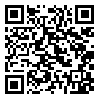BibTeX | RIS | EndNote | Medlars | ProCite | Reference Manager | RefWorks
Send citation to:
URL: http://hnmj.gums.ac.ir/article-1-241-en.html
Introduction: Undoubtedly, following religious laws is unseperatable part of every Muslim’s life. Medical personnel especially nurses are the first ones who can guide patients regarding their illness. Also since one of the important issues in nursing process is to alleviate patients’ needs and spiritual needs are important and most people in our country are Muslims. Therefore, religious laws that involve patients and nurses get special attention. Among these religious laws are those related to parturition and nurses and Midwives should alleviate these needs.
Objective: The goal of this study was to determine women’s Knowledge regarding religious laws of parturition.
Methods: This is a descriptive - analytic study. Sample consisted of 100 patients referring to delivery ward in Emam Hassan Mojtaba Hospital for delivery or prenatal problems. Samples were chosen by simple random method and data collection instrument was a questionnaire which was completed by an educated questioner. Data were analyzed by SPSS.
Results: Findings showed that the majority (57/3%) had moderate knowledge regarding religious laws of parturition. Most (60%) samples didn’t even know the duration of parturition and stated that the duration was 40 days. Only (11%) of samples had good knowledge about praying during parturition. It’s necessary to say that according to X2 test there was a significant relationship between knowledge regarding religious laws of parturition and patient’s education(P=0.002), education of spouse(P=0.01) and occupation of spouse(P=0.04). Also according to Analysis Variance test there was a significant relationship between mean score of knowledge and occupation of spouse (P=0.02). And according to Fisher test, there was a significant and inverse relationship between practicing religious laws of parturition and years of marriage (P=0.03).
Conclusion: Most samples had moderate knowledge, regarding religious laws of parturition and this is weak for our Islamic society. Therefore this matter necessitates giving information regarding religious laws because it can increase patients’ satisfaction of care. In attention to weak knowledge of patients and since one of main problems in medical affairs is lack of patients’ knowledge it is suggested to that patient teaching can be concluded that it is necessary to educate the women to improve the patient regarding religious laws to become one of medical team’s main duty.
Received: 2014/08/16 | Accepted: 2014/08/16 | Published: 2014/08/16
| Rights and permissions | |
 | This work is licensed under a Creative Commons Attribution-NonCommercial 4.0 International License. |



